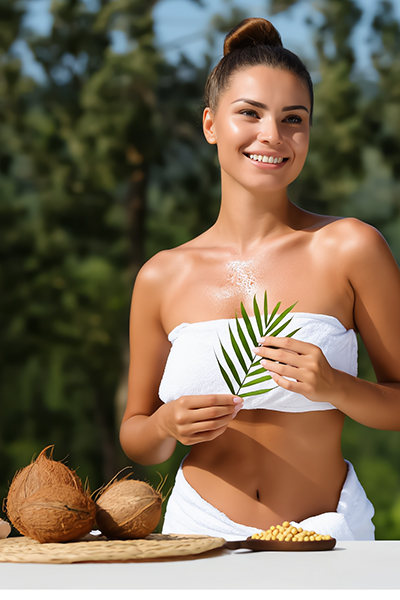No products in the cart.: $0.00
Glycerin

Glycerin, also known as glycerol, is a natural humectant used in skincare, haircare, and cosmetics to attract and retain moisture. It’s a colorless, odorless, viscous liquid that helps hydrate skin and hair, improve product texture, and enhance smoothness. Widely used due to its versatility and affordability, glycerin is a staple in moisturizers, serums, cleansers, and soaps.
What is it Made of?
Glycerin is a trihydroxy sugar alcohol (C3H8O3) derived from
-
- Vegetable Sources: Most commonly from plant oils (e.g., palm, coconut, soybean) through hydrolysis during soap-making or biodiesel production, where triglycerides are broken down into fatty acids and glycerol.
- Animal Sources: Can be obtained from animal fats (tallow or lard), though vegetable glycerin is more common in modern cosmetics for vegan and ethical reasons.
- Synthetic Sources: Produced from petroleum-based compounds in some industrial processes, but this is less common in skincare. Its composition is:
- C3H8O3: A simple triol (three hydroxyl groups) that binds water and provides emollient properties.
Vegetable glycerin is biodegradable, vegan (when plant-derived), and aligns with clean beauty standards.
Best Skin Type for Using It:
-
- Dry Skin: It’s particularly effective for dry skin as it helps to retain moisture.
- Oily Skin: Glycerin won’t clog pores, making it suitable for acne-prone or oily skin types.
- Sensitive Skin: Generally well-tolerated, though a patch test is recommended due to individual variations in skin sensitivity.
- Combination Skin: Helps balance moisture where needed without adding excess oil.
Benefits of Glycerin
-
- Hydration: Acts as a humectant, drawing moisture into the skin, which can improve skin plumpness and reduce the appearance of fine lines.
- Barrier Function: Enhances the skin’s natural barrier, reducing transepidermal water loss.
- Healing: Has soothing and anti-inflammatory properties that can aid in healing, making it beneficial for skin irritations or conditions like eczema.
- Texture: Improves the feel of skincare products, providing a smoother application and feel.
- Strengthens Skin Barrier: Supports the skin’s natural protective function, improving resilience.
- Smooth Texture: Enhances product spreadability and leaves skin soft without greasiness.
- Hair Hydration: Moisturizes hair and scalp, reducing dryness, frizz, and breakage.
- Non-Comedogenic: Hydrates oily skin without contributing to acne or clogged pores.
Pros and Cons of Glycerin
Pros:
-
- Naturally derived (when vegetable-based), biodegradable, and vegan, aligning with eco-friendly beauty.
- Highly effective, affordable humectant, comparable to Sodium Hyaluronate or Sodium PCA.
- Non-comedogenic, safe for oily and acne-prone skin.
- Gentle and non-irritating, ideal for sensitive skin.
- Versatile in skincare (moisturizers, cleansers) and haircare (conditioners, sprays).
- Enhances the efficacy of other hydrating ingredients.
- Highly effective at hydrating the skin without feeling heavy or greasy.
- Non-comedogenic, suitable for acne-prone skin.
- Can improve the efficacy of other active ingredients in formulations.
Cons:
-
- Moisture Dependency: In low-humidity environments, may pull water from skin, causing dryness unless paired with occlusives (e.g., beeswax).
- Sticky Feel: High concentrations can feel tacky or sticky on skin.
- Limited Active Benefits: Primarily a hydrator, lacking antioxidant or exfoliating properties like rosehip oil or sodium lactate.
- Allergic Potential: Extremely rare, but sensitivities to glycerin may occur.
- Dilution Needed: Pure glycerin can be too potent and dehydrating; best used in formulated products.
- Source Concerns: Non-vegan (animal-derived) or unsustainably sourced (e.g., non-RSPO palm oil) glycerin may raise ethical issues.
- In very dry climates, glycerin might pull moisture from deeper layers of the skin if there’s not enough humidity, potentially causing dryness unless paired with occlusive ingredients.
- High concentrations might leave a sticky residue if not formulated correctly.
Disclaimer:
The information in this blog post is for educational purposes only and is not a substitute for professional medical or dermatological advice. Always consult a qualified dermatologist or healthcare provider before using glycerin-based products, especially if you have sensitive, allergy-prone, or compromised skin, or pre-existing skin conditions. Individual results may vary, and some users may experience rare allergic reactions or irritation, particularly with high concentrations or improper use. Patch testing is recommended before use. The author is not liable for any adverse effects resulting from the use of glycerin based on this information. Claims are based on peer-reviewed scientific research, but the efficacy of glycerin can vary depending on formulation, concentration, and individual skin type.



